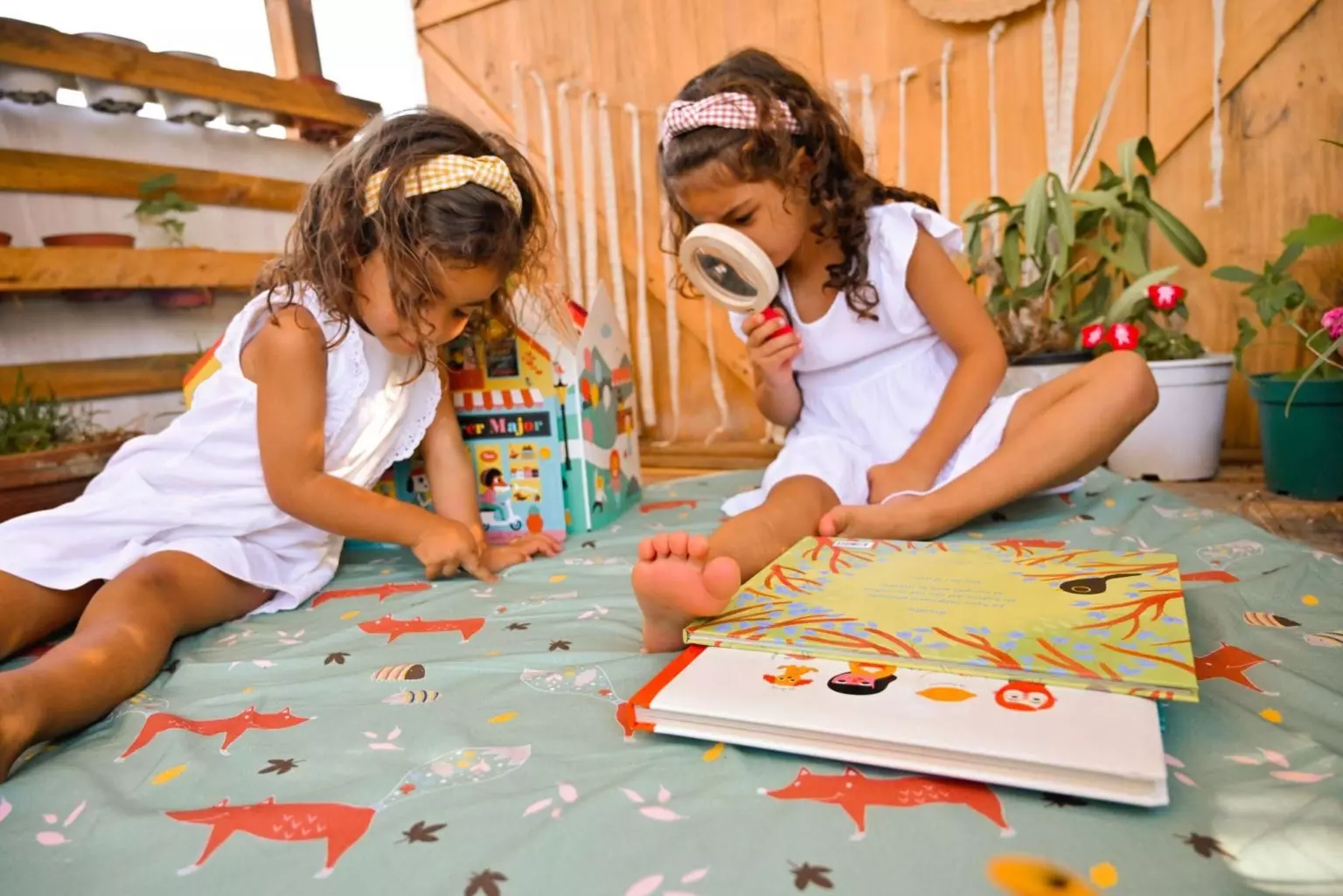What is Symbolic Play?
Symbolic play is a type of play where children, through their imagination, represent situations and fictional characters.
Through this activity, children can explore and learn about the world by interpreting and recreating various real-life scenarios.
Symbolic play allows children to experience different roles and situations that may not be part of their everyday reality.
They can become doctors, teachers, superheroes, parents, or any other figure they wish to embody at that moment.
This ability to assume roles and portray different characters provides them with the opportunity to explore different perspectives and develop social, emotional, and cognitive skills.
Objectives of Symbolic Play
Symbolic play is not only a fun form of entertainment for children but also serves various important objectives in their development.
Below, we will describe some of the key objectives that children can achieve through symbolic play:
Exploration of the environment and understanding of the world around them:
Through symbolic play, children have the opportunity to explore and understand the environment around them.
They can recreate everyday situations, such as playing store, imitating their parents cooking, or pretending to be in school.
Through these symbolic representations, children acquire knowledge about how things work, the relationships between people and objects, and social dynamics.
They learn about roles and responsibilities, develop their observational skills, and gain a better understanding of life in society.
Development of motor skills and coordination:
In symbolic play, children use objects, perform movements, and coordinate actions.
These activities help them develop fine and gross motor skills, improve their coordination, strengthen muscles, and refine their balance.
Symbolic play provides a safe environment for children to practice and enhance their physical skills using their imagination.
The Importance of Symbolic Play in Children’s Growth and Learning
Symbolic play plays an important role in the growth and learning of children’s lives.
Below, we will explain its significance in different aspects of child development:
Influence on knowledge and skill acquisition:
Symbolic play provides children with a platform to explore and acquire knowledge about the world around them.
Through role-playing and situational representation, children learn about different contexts and how to interact within them.
For example, when playing as teachers, they can learn about the role of an educator and how to teach others. Similarly, symbolic play allows them to practice practical skills, such as counting money in an imaginary store or using toy tools to fix things. In this way, children acquire knowledge and skills in a fun and meaningful manner.
Promotion of abstract thinking and symbolic representation:
Symbolic play involves the ability to represent objects and situations symbolically, assigning them different meanings from their original function. This skill fosters abstract thinking in children as they imagine and make connections between the real and the represented.
For example, when a child uses a box as a boat, they are using abstract thinking by recognizing that the box can represent something different from its original form.
This development of abstract thinking is fundamental for later learning as it facilitates the understanding of more complex concepts in various areas, such as mathematics or problem-solving.
Relationship between symbolic play, expression of emotions, and identity construction:
Symbolic play allows children to express and explore a wide range of emotions. By assuming different roles, they can experience and understand emotions such as joy, sadness, fear, or frustration.
This emotional representation provides them with a safe avenue to explore and process their own feelings, as well as to understand the emotions of others. Additionally, symbolic play also contributes to the construction of identity.
Children can experiment and test different roles and behaviors, which helps them develop a clearer understanding of themselves and how they relate to the world around them.
Benefits of Symbolic Play in Child Development
Symbolic play offers various benefits for children’s development.
Below, we will explore some of these benefits:
Stimulation of creativity and imagination:
Symbolic play provides children with the opportunity to unleash their creativity and develop an active imagination.
By assuming different roles and creating fictional scenarios, children can invent stories, solve imaginary problems, and explore unlimited possibilities.
This type of play fosters the generation of original and creative ideas, as well as the ability to think unconventionally.
Development of cognitive and linguistic skills:
Through symbolic play, children develop their cognitive and linguistic skills.
To create roles and situations, they must organize their thoughts. Additionally, symbolic play exercises language and communication, as children use speech to bring characters to life, express thoughts and emotions, and engage in imaginary social interactions.
This process of verbal and non-verbal communication enhances their vocabulary, linguistic fluency, and expressive abilities.
Promotion of socialization and cooperative play:
Symbolic play provides children with the opportunity to interact and socialize with their peers. Through role-playing, they learn to negotiate, cooperate, share, and respect the rules of the game.
Engaging in symbolic play fosters the development of social skills such as empathy, perspective-taking, and the ability to work as a team. Children learn to understand and respect others’ opinions and emotions, thereby strengthening their social skills and their capacity to establish positive relationships with others.
Enhancement of emotional development and problem-solving:
Symbolic play offers children a safe space to explore and express emotions. Through the representation of characters and situations, they can experience different moods and learn to manage and regulate their emotions. Additionally, symbolic play provides them with the opportunity to face imaginary challenges and solve problems in creative ways.
This practice allows them to develop problem-solving skills, critical thinking, and mental flexibility.

Examples of Symbolic Play
Symbolic play offers children the possibility to immerse themselves in a variety of imaginary situations and scenarios.
Here are examples of different types of symbolic play in which children can engage:
Role-Playing:
Role-playing is a common form of symbolic play where children assume different roles and portray real-life situations. They can play as doctors, nurses, teachers, parents, police officers, firefighters, astronauts, and more. Through these roles, children imitate and act like adults and professions they encounter in their environment.
They can use costumes, accessories, and symbolic objects to make the experience more realistic and enjoyable.
Adult Imitation:
Children often imitate adults through symbolic play. They may borrow daily activities and tasks from their parents, such as cooking, cleaning, taking care of a baby, grocery shopping, or driving a car.
By imitating adults, children learn about roles and responsibilities, develop practical skills, and explore different everyday life situations.
Imaginary Scenarios:
Imaginary scenarios are an exciting part of symbolic play where children create fictional worlds and imaginary situations. They can build forts, castles, or treehouses and bring imaginary characters to life, such as princesses, pirates, superheroes, or fantastical creatures.
In these scenarios, children explore their creativity and create their own stories, facing challenges and solving problems in imaginative ways.
Social Role-Playing:
This type of symbolic play involves the representation of social interactions and real-life situations.
Children can play as friends, siblings, classmates, or neighbors, and recreate situations like going to a birthday party, sharing a picnic, or resolving conflicts. Through these social role-playing games, children practice communication skills, empathy, and conflict resolution, thereby strengthening their social and emotional abilities.
Fostering Symbolic Play in Children
Fostering symbolic play is an activity that contributes to children’s development.
Here are some suggestions to stimulate and promote symbolic play in both the family and educational environment:
Provide adequate time and space:
It is essential to dedicate specific time and space for symbolic play. Designate a play area where children have access to materials, toys, and objects that allow them to create and represent different scenarios. Additionally, ensure they have enough uninterrupted time to immerse themselves in their imaginative play.
Offer a variety of materials and resources:
Provide children with a wide range of materials and resources that stimulate their symbolic play. This can include costumes, dolls, toy animals, vehicles, household items, kitchen utensils, work tools, building blocks, and illustrated books. These items can inspire creativity and enrich the possibilities for symbolic play.
Participate actively:
Show interest and actively engage in children’s symbolic play. Join their games by assuming different roles and characters. This will not only foster their creativity but also strengthen emotional bonds and provide opportunities to teach them social skills, problem-solving, and cooperation.
Stimulate imagination and storytelling:
Help children use their imagination and create their games. You can do this by suggesting situations or encouraging them to invent their own stories. You can also provide books that inspire them to develop their own narratives and situations.
Promote outdoor symbolic play:
Outdoor play offers a plethora of opportunities for symbolic play. Encourage children to explore nature and utilize natural elements. Outdoor spaces provide them with more freedom of movement and exploration.
Avoid limiting creativity:
Make sure not to impose restrictive limits on children’s symbolic play. Allow them to express themselves freely, even if their ideas seem unconventional or illogical. Symbolic play is a space for imagination and creativity, and it is important for children to feel free to explore without judgment or restrictions.

Symbolic play is a powerful tool in child development that stimulates creativity, promotes cognitive and social skills, and contributes to children’s emotional growth. Through the representation of roles and imaginary situations, children acquire knowledge, explore emotions, and construct their identity.
By fostering symbolic play in the family and educational environment, we provide children with a space to explore, learn, and grow in a playful and meaningful way.
It is vital to recognize and value the importance of symbolic play as an integral part of childhood and provide the support and resources necessary for children to fully enjoy this enriching experience.
